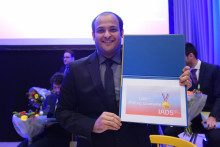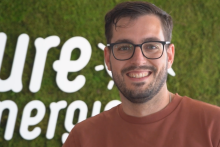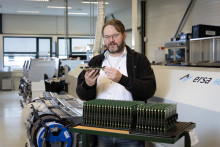‘I was so surprised! Next to my diploma, I got all kinds of nice additional gifts, and some of my fellow candidates wanted to switch with me so they would be the 3000th,’ Ravi tells with a smile. He looks back on his PDEng with a good feeling. We visit him at his new employer Signify, where he started as a data scientist at their supply chain team. ‘After my bachelor in India, I wanted to increase my interest and explore other parts of the world. I was also curious about differences in education in other places. A friend of mine studied in Germany and I liked what he told me about the country and his life. I decided to do my Masters in Computer Science at the Technical University of Braunschweig.’
When he finished that, he started looking for a job. A PDEng program wasn’t on his list at that moment. ‘I was looking for an interesting PhD programs and came across the Data Science PDEng program. I decided to apply and got an invitation for the challenge week they host to find the best candidates.’
Data Challenge Week
This PDEng program isn’t part of one particular faculty but belongs to the Jheronimus Academy of Data Science (JADS), a joint initiative of Eindhoven University of Technology, Tilburg University, and the Data Science Centre Eindhoven. ‘The 24/7 Data Challenge Week was intense. The assessors look at the big picture of every candidate. Of course, you need a technical background, but they also look at skills and attitudes like creativity, self-awareness, critical thinking, being a team player, and communication. In five days you work with your team on challenges and in the end, you present your solutions.’
A big part of the PDEng program is focused on developing your personal skills. Per week 25 hours are for cases, 15 hours are for personal development. During the program, the candidates must take part in the challenge week for new candidates. ‘You work with the new group and have a role as a team member or a team leader. You also learn a lot about yourself. I learned that I’m a good facilitator by making people feel at ease and giving guidance. Later on, I worked on my leadership qualities when we were asked to arrange a data science module for the TU/e. I was in charge of the project and was a team leader of one of the challenges. The goal was to give students a flavor of data science on a level that was comprehensible for them. What I really like about the PDEng program is that you work on your goals. Your group members give feedback with a coach present. Every three months you have a talk with the coach about achieving the goals and how everything is going. The courses for personal development are also aligned with our goals.’
Find your hidden talents’
The people at the data science PDEng are very diverse, says Ravi. ‘They come from all around the world, completed all kinds of studies and have different views on assignments. The program learns you to work effectively in international teams. In one group I worked with a Dutch and Bulgarian person. In India, we are not very direct, but in this group, I learned it is sometimes better to be direct and transparent. In India, people wouldn’t say ‘no’ immediately and give it at least a try, to tell you later that something doesn’t work out. In the Dutch daily life I learned that when you have a dinner party and the host asks if you want more food and you say no, they don’t offer it again. That is something I had to get used to.’
His overall experience in the PDEng program was good. ‘It is intensely challenging, but you will find your hidden talents and improve yourself. You get the benefits of being a student, learn, gather work experience and get paid. It is a really valuable program for the rest of your career.’
Stan Ackermans Institute
Are you a young professional graduate, or are you currently completing your master programme at a technical university? Are you interested in technological design and do you want to strengthen your chances on the job market? Are you explicitly pursuing a career in industry or business? Then perhaps the post-master technological designer programmes from the Stan Ackermans Institute are something for you. You can follow these programmes at four different Dutch technical universities.
The education programmes in the field of technological design take two years and participant will get paid. After obtaining your master’s degree from a technological education programme, you can enter a selection procedure and eventually enrol in one of the programmes. Eventually, you will be awarded a Professional Doctorate in Engineering (PDEng).
During your post-master in technological design, you not only deepen your knowledge of technology, but also learn how to put this into practice. In addition, you work on improving your professional skills, thus strengthening your opportunities on the job market. Eindhoven University of Technology provides most of the programmes (ten in total), whilst Delft University of Technology offers four programmes, and the University of Twente provides five. It is currently not yet possible to follow an education programme in design at Wageningen University & Research.
Text: Sabine te Braake
Photo: Diewke van den Heuvel
--
This article was published in the second editon of the 4TU Career Special, a shared publication by the news editors of Cursor (Eindhoven University of Technology), Delta (Delft University of Technology), Resource (Wageningen University and Research), and U-Today (University of Twente). The magazine came into being in collaboration with industry, and is explicitly aimed towards students who are either in the final phase of their studies, or have just graduated.









